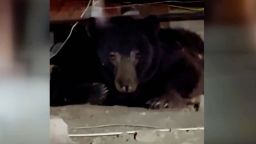It was supposed to be a celebration, but one family’s unique meal of black bear meat sent several members to the hospital instead.
The celebration happened in summer 2022, according to the account in the latest edition of the US Centers for Disease Control and Prevention’s Morbidity and Mortality Weekly Report. An extended family – unnamed in the report – came from across the country for a reunion in South Dakota.
One family member, a hunter, brought some black bear meat that he had harvested in northern Saskatchewan in May 2022. The hunter said that the hunting outfitter had recommended freezing the meat to kill any potential parasites.
Ad Feedback
The meat had been frozen for 45 days before it was thawed, and the family grilled it with some vegetables and served it as kebabs.
Freezing can kill some parasites commonly found in black bears, but according to the World Organisation for Animal Health, some species of parasites are freeze-tolerant.
Bears and other wildlife including wild boar, wolves and squirrels can often get sick with trichinellosis, a serious disease caused by parasitic roundworms of the genus Trichinella, but they will often appear perfectly healthy. When butchering the meat, it would be difficult to tell if it was contaminated because there are few signs of the parasite.
Many wildlife experts tell bear hunters to consider all bear meat infected, and the CDC recommends cooking the meat thoroughly to an internal temperature of at least 165 degrees Fahrenheit to kill the parasites. Smoking, salting, drying and microwaving do not always kill them, experts say.
The meat at the family reunion was initially served rare, but that was not the chef’s intention, the CDC said. Rather, it was “difficult for the family members to visually ascertain the level of doneness” because the meat was dark in color. After some of the family noticed that it was undercooked, they put it back on the grill before it was served again.
It wasn’t until after people had gone home that some started to get sick.
The first illness was in a 29-year-old man who had to be hospitalized twice over a three-week period. He reported symptoms of severe muscle pain and a fever, and his eyes became swollen. Blood tests showed that he had eosinophilia, a condition involving too many eosinophils in the body, a signal to doctors that someone could have allergies, cancer or parasites.
It wasn’t until his second trip to the hospital that doctors learned the man had eaten bear meat and suspected that he may have trichinellosis. Tests soon confirmed that that was the case, and tests were recommended for the other family members.
Trichinellosis can be a light or severe infection, and the symptoms can depend on where the larvae migrate to in the body. Light infections may not have noticeable symptoms, according to the CDC. If the parasite moves into the gastrointestinal tract, it can cause abdominal pain, diarrhea or vomiting. In muscle, it can cause a fever, rashes, conjunctivitis and facial puffiness. Occasionally, there may be life-threatening symptoms including heart problems, trouble with the central nervous symptom and breathing issues.
Among the eight family members whom investigators interviewed, six had symptoms that were consistent with trichinellosis. Four had eaten bear meat and vegetables, but the other two had eaten only vegetables cooked with the meat. Three family members had to be hospitalized.

The hospitalized people got trichinellosis-directed treatment with albendazole, an antiparasitic drug. Those who were not hospitalized received only supportive care since their symptoms had resolved before it was determined they had the infection. Everyone has since recovered.
In the course of the investigation, CDC labs received samples of the frozen bear meat and found Trichinella larvae, and the hunter was advised to discard any remaining meat. The CDC also informed the Public Health Agency of Canada about the outbreak since the bear had come from that country.
The CDC says it’s important that game meat – particularly wild game harvested in northern latitudes – be cooked thoroughly.
Since meat that is contaminated with Trichinella can cross-contaminate other foods, raw meat should be stored and prepared separately from other foods. The CDC also recommends that government agencies and private groups that organize or oversee hunting should educate hunters about these risks and how to protect themselves.








